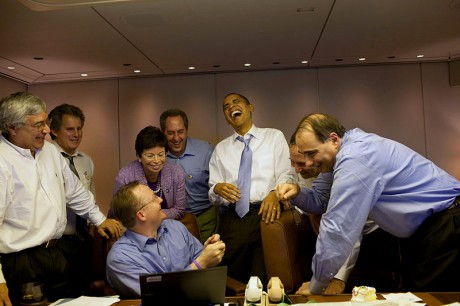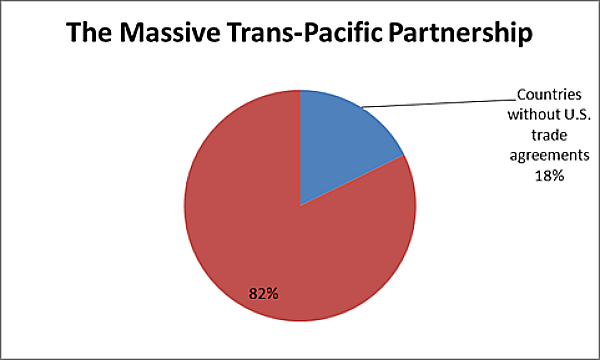End Of The American Dream
The American Dream Is Becoming A Nightmare And Life As We Know It Is About To Change
The Trans-Pacific Partnership: Permanently Locking In The Obama Agenda For 40 Percent Of The Global Economy

We have just witnessed one of the most significant steps toward a one world economic system that we have ever seen. Negotiations for the Trans-Pacific Partnership have been completed, and if approved it will create the largest trading bloc on the planet. But this is not just a trade agreement. In this treaty, Barack Obama has thrown in all sorts of things that he never would have been able to get through Congress otherwise. And once this treaty is approved, it will be exceedingly difficult to ever make changes to it. So essentially what is happening is that the Obama agenda is being permanently locked in for 40 percent of the global economy.
The United States, Canada, Japan, Mexico, Australia, Brunei, Chile, Malaysia, New Zealand, Peru, Singapore and Vietnam all intend to sign on to this insidious plan. Collectively, these nations have a total population of about 800 million people and a combined GDP of approximately 28 trillion dollars.
Of course Barack Obama is assuring all of us that this treaty is going to be wonderful for everyone…
In hailing the agreement, Obama said, “Congress and the American people will have months to read every word” before he signs the deal that he described as a win for all sides.
“If we can get this agreement to my desk, then we can help our businesses sell more Made in America goods and services around the world, and we can help more American workers compete and win,” Obama said.Sadly, just like with every other “free trade” agreement that the U.S. has entered into since World War II, the exact opposite is what will actually happen. Our trade deficit will get even larger, and we will see even more jobs and even more businesses go overseas.
Read More Here
........................................................................................................
Trans-Pacific Partnership Deal Struck As "Corporate Secrecy" Wins Again
Submitted by Tyler Durden on 10/05/2015 17:46 -0400
Once again the corporatocracy wins as the so-called "Trojan horse" Trans-Pacific Partnership (TPP) trade agreement has been finalized. As WSJ reports,
the U.S., Japan and 10 countries around the Pacific reached a historic
accord Monday to lower trade barriers to goods and services and set commercial rules of the road for two-fifths of the global economy, officials said.
For the U.S., the TPP (reportedly) opens agricultural markets in Japan and Canada, tightens intellectual property rules to benefit drug and technology companies, and establishes a tightknit economic bloc to challenge China’s influence in the region (likely forcing their hand into separate trade agreements).
However, Obama is likely to face a tough fight to get the deal through Congress(especially in light of presidential candidates' opposition).

The US, Japan and 10 other Pacific Rim economies have reached agreement to strike the largest trade pact seen anywhere in two decades, in what is a huge strategic and political win for US President Barack Obama and Japan’s Shinzo Abe.
Read More HereFor the U.S., the TPP (reportedly) opens agricultural markets in Japan and Canada, tightens intellectual property rules to benefit drug and technology companies, and establishes a tightknit economic bloc to challenge China’s influence in the region (likely forcing their hand into separate trade agreements).
However, Obama is likely to face a tough fight to get the deal through Congress(especially in light of presidential candidates' opposition).

The US, Japan and 10 other Pacific Rim economies have reached agreement to strike the largest trade pact seen anywhere in two decades, in what is a huge strategic and political win for US President Barack Obama and Japan’s Shinzo Abe.
................................................................................................................
FAIR
‘Massive’ Media Hype for TPP
By Dean Baker
It
is amazing how the elite media can be dragged along by their noses into
accepting that the Trans-Pacific Partnership (TPP) can have a big
impact on trade and growth. If I had a dollar for every time the deal
was described as “massive,” or that we were told what share of world trade
will be covered by the TPP, I would be richer than Bill Gates. The
reality is that the vast majority of the trade between the countries in
the TPP is already covered by trade agreements, as can be seen:

We continue to hear superlatives even as the evidence suggests the trade impact will be trivial. For example, the New York Times reported that US tariffs on Japanese cars will be phased out over 30 years. Wow! The most optimistic growth estimates show a cumulative gain by 2027 of less than 0.4 percent, roughly two months of normal GDP growth.
This doesn’t mean that the TPP can’t have an impact. It will lock in a regulatory structure, the exact parameters of which are yet to be seen. We do know that the folks at the table came from places like General Electric and Monsanto, not the AFL-CIO and the Sierra Club. We also know that it will mean paying more for drugs and other patent and copyright-protected material (forms of protection, whose negative impact is never included in growth projections), but we don’t yet know how much.
We also know that the Obama administration gave up an opportunity to include currency rules. This means that trade deficit is likely to persist long into the future. This deficit has been a persistent source of gap in demand, leading to millions of lost jobs. We filled this demand in the 1990s with the stock bubble and in the last decade in the housing bubble. It seems the latest plan from the Fed is that we simply won’t fill the gap in this decade.
Economist Dean Baker is co-director of the Center for Economic and Policy Research in Washington, DC. A version of this post originally appeared on CEPR’s blog Beat the Press (10/6/15).
This work is licensed under a Creative Commons Attribution-NonCommercial-NoDerivs 3.0 Unported License.

TPP countries with and without current trade agreements with the US. Source: International Monetary Fund
This doesn’t mean that the TPP can’t have an impact. It will lock in a regulatory structure, the exact parameters of which are yet to be seen. We do know that the folks at the table came from places like General Electric and Monsanto, not the AFL-CIO and the Sierra Club. We also know that it will mean paying more for drugs and other patent and copyright-protected material (forms of protection, whose negative impact is never included in growth projections), but we don’t yet know how much.
We also know that the Obama administration gave up an opportunity to include currency rules. This means that trade deficit is likely to persist long into the future. This deficit has been a persistent source of gap in demand, leading to millions of lost jobs. We filled this demand in the 1990s with the stock bubble and in the last decade in the housing bubble. It seems the latest plan from the Fed is that we simply won’t fill the gap in this decade.
Economist Dean Baker is co-director of the Center for Economic and Policy Research in Washington, DC. A version of this post originally appeared on CEPR’s blog Beat the Press (10/6/15).
This work is licensed under a Creative Commons Attribution-NonCommercial-NoDerivs 3.0 Unported License.

No comments:
Post a Comment
Hello and thank you for visiting my blog. Please share your thoughts and leave a comment :)